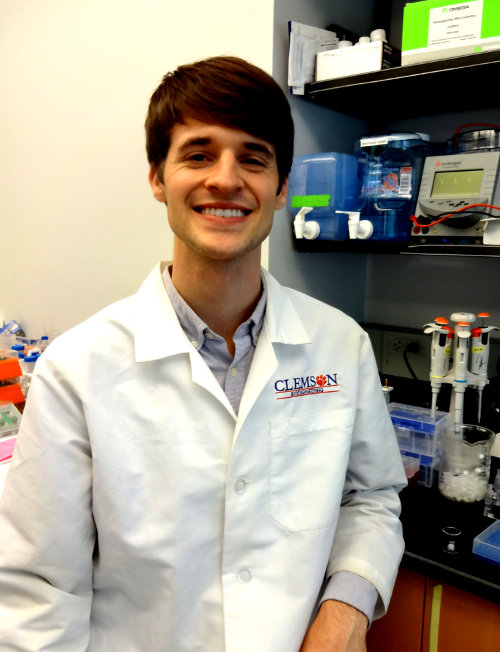

 In 2014, Dylan was awarded two years of support through Medical University of South Carolina's National Heart, Lung, and Blood Institute T32, "Training to Improve Cardiovascular Therapies." He re-applied for an additional year, and in 2017 was awarded a 3rd year on the training grant.
In 2014, Dylan was awarded two years of support through Medical University of South Carolina's National Heart, Lung, and Blood Institute T32, "Training to Improve Cardiovascular Therapies." He re-applied for an additional year, and in 2017 was awarded a 3rd year on the training grant.
Asked about his research, Dylan, a student of Dr. Ying Mei of the Clemson-MUSC Bioengineering Program, said: “My Ph.D. research has focused on engineering human induced pluripotent stem cell-derived cardiomyocyte (hiPSC-CM) microtissues to address the major challenges in cardiac-tissue engineering solutions for heart failure. I have addressed advancing the maturation of hiPSC-CMs and creating a more biomimetic model using cardiac organoids that incorporate cell-cell, cell-matrix, and structural (e.g., vessels) components in the heart.”
Dylan enjoys collaborating with his lab mates and others. “Two minds are better than one, especially in the field of bioengineering. In the end, the freedom I have in Dr. Mei's lab to work across projects/field has encouraged me to strengthen my own capabilities to better contribute to the next project.” Outside the lab, Dylan likewise enjoys spending time with friends and volunteering. “When I'm not working, I enjoy helping others, whether it's helping someone move (there's always somebody moving in Charleston), helping out homeless friends, and most recently using my French minor from college to help translate/teach English for a local Congolese refugee family. I also really enjoy being in the ocean, playing strategy board games (Killer Bunnies=best game), playing percussion/piano in jam bands, growing vegetables, and a million other things.”
According to the NIH, the T32 award helps ensure a diverse, highly trained workforce to meet the Nation’s biomedical, behavioral, and clinical research needs. The T32 provides a strong foundation in research design, methods, and analytic techniques; training to conceptualize research problems; experience in research, presentation, and publication; interaction with the scientific community; and enhanced understanding of the health-related sciences.